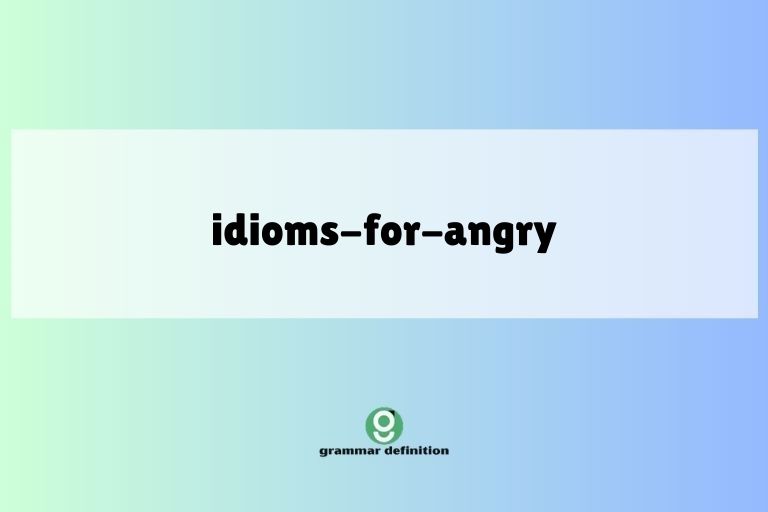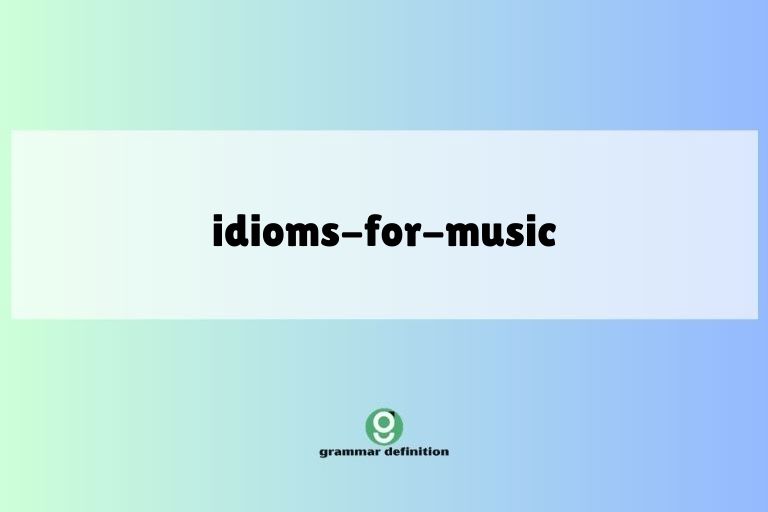Idioms for Anger: Expressing Your Ire with Flair

Anger is a fundamental human emotion, and the English language offers a rich tapestry of idioms to express its various shades and intensities. Mastering these idioms not only enriches your vocabulary but also allows you to communicate more effectively and vividly.
This article delves into the world of idioms related to anger, exploring their meanings, origins, and usage. Whether you’re an ESL learner or a native speaker seeking to expand your linguistic repertoire, this guide will equip you with the tools to express your anger with precision and color.
By understanding these idioms, you’ll gain a deeper appreciation for the nuances of the English language and improve your overall communication skills.
Table of Contents
- Introduction
- Definition of Idioms for Anger
- Structural Breakdown of Anger Idioms
- Types and Categories of Anger Idioms
- Examples of Anger Idioms
- Usage Rules for Anger Idioms
- Common Mistakes with Anger Idioms
- Practice Exercises
- Advanced Topics: The Nuances of Anger Idioms
- Frequently Asked Questions (FAQ)
- Conclusion
Definition of Idioms for Anger
Idioms are expressions whose meanings cannot be understood from the literal meanings of the individual words. They are figurative phrases that have evolved over time to convey specific concepts.
Idioms for anger are phrases that describe various states and intensities of anger, from mild irritation to explosive rage. These idioms add color and depth to our descriptions of emotional states, making our language more expressive and relatable.
Understanding the context in which these idioms are used is crucial, as their literal interpretations are often nonsensical.
Classifying anger idioms helps in understanding their usage. They can be classified based on the intensity of anger they describe, the way anger is expressed, or the attempts to control anger.
For example, “to see red” describes sudden, intense anger, while “to simmer down” refers to calming oneself down after being angry. The function of these idioms is to provide a more vivid and concise way to express emotions.
Instead of saying “He was very angry,” one could say “He blew a fuse,” which is more impactful and descriptive. The context in which these idioms are used is vital; using a highly intense idiom to describe a mild annoyance would be inappropriate and confusing.
Structural Breakdown of Anger Idioms
The structure of anger idioms varies widely. Some are verb phrases, such as “fly off the handle,” while others are noun phrases, such as “a fit of pique.” Many involve metaphorical language, drawing comparisons to other objects or actions.
For instance, “to bite someone’s head off” uses the image of biting to convey the intensity of a verbal attack. Understanding the grammatical structure of these idioms is important for using them correctly in sentences.
Knowing whether an idiom is a verb, noun, or adjective phrase will help you integrate it seamlessly into your speech and writing. The patterns within these idioms often reflect cultural understandings of anger.
Animal metaphors, like “mad as a hornet,” tap into commonly held beliefs about animal behavior and human emotions.
Many anger idioms follow specific patterns. Some involve prepositions, like “up in arms,” while others use similes, such as “fuming like a volcano.” Recognizing these patterns can help you remember and use these idioms more effectively.
The rules governing their usage are often implicit and learned through exposure to the language. There are rarely explicit rules, but understanding the connotations and contexts in which they are typically used is crucial.
For example, some idioms are more appropriate for informal settings, while others are suitable for more formal contexts. Paying attention to the tone and register of a conversation will help you choose the most appropriate idiom to express your anger.
Types and Categories of Anger Idioms
Anger idioms can be categorized based on the intensity and nature of the anger they describe. Here are some key categories:
Idioms for Sudden Anger
These idioms describe anger that arises quickly and unexpectedly. They often convey a sense of impulsiveness and lack of control.
Idioms for Simmering Anger
These idioms refer to anger that builds up slowly over time, often hidden beneath the surface. They suggest a sense of suppressed frustration that is waiting to explode.
Idioms for Intense Anger
These idioms describe extreme rage and fury. They often involve violent imagery and convey a sense of overwhelming emotion.
Idioms for Expressing Anger
These idioms focus on the ways in which anger is outwardly displayed, whether through words or actions. They highlight the behavioral manifestations of anger.
Idioms for Controlling Anger
These idioms describe attempts to manage and suppress anger. They often involve strategies for calming down and regaining composure.
Examples of Anger Idioms
The English language is replete with idioms to describe anger. Here are some examples categorized by the type of anger they represent:
Sudden Anger Examples
These idioms describe anger that erupts quickly and unexpectedly. They often suggest a lack of control and a rapid escalation of emotions.
The table below provides examples of idioms that describe sudden anger, along with their meanings and example sentences.
| Idiom | Meaning | Example Sentence |
|---|---|---|
| Fly off the handle | To suddenly lose one’s temper | He flew off the handle when he saw the dent in his new car. |
| Snap | To suddenly lose control and become angry | She snapped at her colleague after a long and stressful day. |
| Go ballistic | To become extremely angry and irrational | My dad went ballistic when he found out I had skipped school. |
| Blow a fuse | To suddenly become very angry | He blew a fuse when the printer jammed again. |
| Hit the roof | To become extremely angry | My mother hit the roof when she saw my grades. |
| Go through the roof | To become extremely angry | He went through the roof when he heard the news. |
| Lose it | To lose control of one’s emotions, especially anger | She lost it when she realized she had been cheated. |
| Flip your lid | To become extremely angry | He flipped his lid when he found out about the broken window. |
| See red | To become extremely angry | I saw red when he insulted my family. |
| Go apeshit | To become extremely angry and violent | The crowd went apeshit after the controversial call. |
| Go bananas | To become extremely angry or excited | He went bananas when he won the lottery. |
| Go nuts | To become extremely angry or crazy | She went nuts when she found out she was pregnant. |
| Come unglued | To become very upset or angry | He came unglued when he lost his job. |
| Have a cow | To become extremely upset or angry | Don’t have a cow! It’s just a minor mistake. |
| Throw a fit | To have a sudden outburst of anger | The child threw a fit in the middle of the store. |
| Blow your stack | To lose your temper | He blew his stack when he heard the accusations. |
| Hit the ceiling | To become extremely angry | The boss hit the ceiling when the project was late. |
| Go off the deep end | To become extremely angry or irrational | He went off the deep end when he lost his investment. |
| Pop your cork | To suddenly become angry | She popped her cork when she was interrupted. |
| Take a dim view of | To disapprove strongly of something | The teacher took a dim view of the students’ behavior. |
| Go spare | To become extremely angry or upset | My dad went spare when he found out I crashed the car. |
| Have kittens | To be very anxious, upset, or angry | My mother will have kittens if I don’t call her tonight. |
| Get your knickers in a twist | To become unnecessarily upset or angry | Don’t get your knickers in a twist, it’s not a big deal. |
| Go postal | To become extremely angry and violent (often used humorously) | He almost went postal when his computer crashed. |
Simmering Anger Examples
These idioms describe anger that builds up gradually over time. They suggest a sense of suppressed frustration and resentment.
The table below provides examples of idioms that describe simmering anger, along with their meanings and example sentences.
| Idiom | Meaning | Example Sentence |
|---|---|---|
| Stew | To be in a state of suppressed anger or worry | He was stewing over the unfair criticism he received. |
| Seethe | To be filled with intense but unexpressed anger | She was seething with resentment after being passed over for the promotion. |
| Bite your tongue | To refrain from speaking out of anger or frustration | I had to bite my tongue to avoid arguing with my boss. |
| Harbor a grudge | To hold a persistent feeling of resentment or ill will | He harbored a grudge against his former business partner. |
| Let something fester | To allow a negative feeling or problem to worsen over time | Don’t let your anger fester; talk about it openly. |
| Hold a candle to | To be nearly as good as someone or something else. (Often used in the negative to express anger or disappointment.) | This new phone doesn’t hold a candle to my old one! |
| Keep a lid on | To keep something secret or under control, especially anger | He tried to keep a lid on his frustration during the meeting. |
| Bottle up | To suppress or conceal one’s feelings | She tended to bottle up her emotions, which eventually led to outbursts. |
| Simmer | To be in a state of suppressed anger | He was simmering with indignation after the insult. |
| Grin and bear it | To endure something unpleasant with a smile | She had to grin and bear it during the boring presentation. |
| Mutter under your breath | To speak quietly and indistinctly, often expressing anger | He was muttering under his breath about the traffic. |
| Nurse a grievance | To dwell on a past wrong and feel resentful | He nursed a grievance against the company for years. |
| Smolder | To show or feel suppressed anger or resentment | Her eyes smoldered with anger as she listened to the accusations. |
| Breathe fire | To be very angry and threatening | He was practically breathing fire when he heard what happened. |
| Have a bone to pick | To have a grievance that needs to be discussed | I have a bone to pick with you about the way you spoke to me. |
| Mark my words | Pay attention to what I am saying (often used when predicting something negative due to anger or frustration) | Mark my words, this project is going to fail! |
| On the warpath | In a state of angry confrontation | She’s on the warpath after finding out about the lies. |
| Slow burn | A feeling of anger that increases slowly over time | His anger was a slow burn, building up over weeks. |
| Under your skin | To annoy or irritate someone | His constant complaining was getting under my skin. |
| Rub someone the wrong way | To irritate or annoy someone unintentionally | He tends to rub people the wrong way with his blunt comments. |
| Get bent out of shape | To become angry or upset | Don’t get bent out of shape over such a small issue. |
| Keep your shirt on | To remain calm and not get angry | Keep your shirt on! We’ll figure out a solution. |
| Chew on something | To think about something that is bothering you, often with anger or frustration | I’ve been chewing on what he said all day. |
| Rankle | To cause annoyance or resentment that persists | The insult continued to rankle him for days. |
Intense Anger Examples
These idioms describe extreme anger and fury. They often involve violent imagery and convey a sense of overwhelming emotion.
The table below provides examples of idioms that describe intense anger, along with their meanings and example sentences.
| Idiom | Meaning | Example Sentence |
|---|---|---|
| Mad as a hornet | Extremely angry | He was mad as a hornet when he found out about the betrayal. |
| Fit to be tied | Extremely angry and agitated | She was fit to be tied when she discovered the damage. |
| In a rage | In a state of intense anger | He stormed out of the room in a rage. |
| Up in arms | Extremely angry and protesting | The community was up in arms about the proposed development. |
| See stars | To be dazed or stunned, often from anger or pain | He was so angry he saw stars. |
| Foaming at the mouth | Extremely angry and irrational | He was foaming at the mouth with fury. |
| Livid | Extremely angry; furious | She was absolutely livid when she heard the news. |
| Incensed | Very angry; enraged | He was incensed by the false accusations. |
| Wrathful | Full of intense anger | His face was wrathful as he confronted the offender. |
| Outraged | Extremely angry and shocked | The public was outraged by the politician’s corruption. |
| Like a bull in a china shop | Acting recklessly and clumsily due to anger | He stormed through the office like a bull in a china shop. |
| Ready to kill | Extremely angry and potentially violent | He was so angry he felt ready to kill. |
| Blood boiling | Feeling intense anger | His blood was boiling when he heard the insults. |
| Beside yourself with anger | Overcome with anger | She was beside herself with anger after the argument. |
| Blow a gasket | To become extremely angry (similar to “blow a fuse”) | He blew a gasket when he saw the damage to his car. |
| In high dudgeon | In a state of great anger or resentment | He left the meeting in high dudgeon. |
| Seething with rage | Filled with intense, suppressed anger | She was seething with rage after being publicly humiliated. |
| Out for blood | Seeking revenge in anger | He was out for blood after being cheated. |
| Ticked off | Annoyed or angry (informal) | He was really ticked off about the delay. |
| Upset the apple cart | To disrupt a plan or situation, often leading to anger | His sudden resignation upset the apple cart. |
| Go off on someone | To suddenly start shouting at someone in anger | He went off on his colleague for making a mistake. |
| Spit nails | To be extremely angry | She was spitting nails when she found out about the lies. |
| Throw a wobbly | To have a fit of anger or bad temper (British English) | He threw a wobbly when he couldn’t find his keys. |
| Ballistic | Extremely angry; irrational | She went completely ballistic when she heard the news. |
Expressing Anger Examples
These idioms describe the ways in which anger is outwardly displayed, whether through words or actions. The table below provides examples of idioms that describe expressing anger, along with their meanings and example sentences.
| Idiom | Meaning | Example Sentence |
|---|---|---|
| Bite someone’s head off | To speak to someone sharply and angrily | He bit my head off when I asked a simple question. |
| Give someone a piece of your mind | To express your anger or disapproval to someone | I’m going to give him a piece of my mind for his rude behavior. |
| Let someone have it | To scold or criticize someone severely | The boss let him have it for missing the deadline. |
| Tell someone off | To reprimand someone angrily | The teacher told the student off for cheating. |
| Read someone the riot act | To give someone a severe warning or reprimand | The coach read the team the riot act after their poor performance. |
| Tear someone to shreds | To criticize someone harshly and thoroughly | The critics tore the movie to shreds. |
| Dress someone down | To scold someone severely | The manager dressed him down for his unprofessional conduct. |
| Give someone a tongue-lashing | To scold someone severely | She gave him a tongue-lashing for his carelessness. |
| Take someone to task | To reprimand or criticize someone for a fault | The supervisor took him to task for his poor attendance. |
| Lay down the law | To state rules or demands firmly | The parents had to lay down the law with their rebellious teenager. |
| Call someone out | To publicly criticize someone for their actions | He called her out for her hypocrisy. |
| Give someone what for | To punish or scold someone | I’m going to give him what for when I see him! |
| Speak your mind | To express your thoughts and feelings openly, even if it’s critical | She always speaks her mind, no matter the consequences. |
| Put your foot down | To assert your authority and refuse to allow something | The parents put their foot down and forbade the party. |
| Come down on someone like a ton of bricks | To punish or criticize someone severely | The boss came down on him like a ton of bricks for the mistake. |
| Have a go at someone | To criticize or attack someone verbally | He had a go at me for being late. |
| Let off steam | To release pent-up emotions, often anger | He went for a run to let off steam. |
| Vent your spleen | To express your anger or frustration freely | He vented his spleen about the company’s policies. |
| Raise your voice | To speak loudly, often in anger | He raised his voice during the argument. |
| Go for the jugular | To attack someone’s most vulnerable point | The lawyer went for the jugular during the cross-examination. |
| Sound off | To express your opinions forcefully, often in anger | He sounded off about the government’s policies. |
| Take exception to something | To object strongly to something | She took exception to his rude comments. |
| Give someone a dressing-down | To scold someone severely | The officer gave the soldier a dressing-down for his insubordination. |
| Air your grievances | To express your complaints or concerns | The employees were given a chance to air their grievances. |
Controlling Anger Examples
These idioms describe attempts to manage and suppress anger. The table below provides examples of idioms that describe controlling anger, along with their meanings and example sentences.
| Idiom | Meaning | Example Sentence |
|---|---|---|
| Keep your cool | To remain calm and composed | It’s important to keep your cool in stressful situations. |
| Hold your horses | To be patient and not rush into action | Hold your horses! Let’s think this through before we act. |
| Simmer down | To calm down after being angry | He needed to simmer down before he could speak rationally. |
| Breathe deeply | To take slow, deep breaths to calm down | When I feel angry, I try to breathe deeply to relax. |
| Count to ten | To pause and calm down before reacting in anger | Before you respond, try to count to ten. |
| Turn the other cheek | To ignore an insult or injury and not retaliate | He decided to turn the other cheek and not respond to the provocation. |
| Let it go | To stop being angry or upset about something | It’s best to let it go and move on with your life. |
| Take a chill pill | To relax and calm down (informal) | You need to take a chill pill and stop worrying so much. |
| Keep a stiff upper lip | To remain stoic and unemotional in the face of adversity | He tried to keep a stiff upper lip despite the bad news. |
| Get a grip | To regain control of your emotions | You need to get a grip and stop panicking. |
| Sleep on it | To delay making a decision until the next day to gain clarity | Don’t make a decision now; sleep on it and see how you feel in the morning. |
| Think better of it | To reconsider an action and decide not to do it, often out of fear of consequences | He was going to yell, but he thought better of it. |
| Bury the hatchet | To make peace after a conflict | It’s time to bury the hatchet and move forward. |
| Patch things up | To resolve a disagreement or conflict | They managed to patch things up after their argument. |
| Let bygones be bygones | To forgive and forget past grievances | We should let bygones be bygones and start over. |
| Rise above it | To not allow something to affect your emotions or behavior | You need to rise above it and not let his comments bother you. |
| Keep your temper | To avoid getting angry | It’s important to keep your temper in negotiations. |
| Take it in stride | To accept something difficult or unpleasant calmly | He took the setback in stride and kept working hard. |
| Turn a blind eye | To ignore something that you know is wrong | The authorities decided to turn a blind eye to the illegal activity. |
| Hold back | To restrain yourself from expressing anger or emotion | He had to hold back his anger during the meeting. |
| Keep something to yourself | To not express your feelings or opinions | He decided to keep his thoughts to himself to avoid an argument. |
| Take the high road | To behave in a morally superior way, especially by not retaliating | She decided to take the high road and not engage in the gossip. |
| Walk it off | To relieve stress or anger by taking a walk | He needed to walk it off after the stressful phone call. |
| Chin up | To remain cheerful despite difficulties | Chin up! Things will get better. |
Usage Rules for Anger Idioms
Using anger idioms effectively requires understanding their specific contexts and connotations. Not all idioms are interchangeable, and some are more appropriate for certain situations than others.
For example, “go postal” is a very strong idiom and should only be used in informal settings and with caution, as it alludes to violence. On the other hand, “take exception to” is a more formal idiom and can be used in professional settings to express disagreement or displeasure.
Understanding the level of formality is crucial for appropriate usage. Some idioms are considered colloquial and are best suited for casual conversations, while others are more refined and suitable for formal writing or speeches.
Pay attention to the cultural context of the idiom. Some idioms may have different meanings or connotations in different cultures.
For example, an idiom that is common and acceptable in American English might be considered offensive or confusing in British English. Be mindful of your audience and their cultural background when using anger idioms.
Also, consider the tone of your communication. Are you trying to be humorous, sarcastic, or genuinely angry?
The idiom you choose should align with your intended tone. Using a lighthearted idiom when you are genuinely furious might undermine your message, while using an overly aggressive idiom when you are simply annoyed might be disproportionate.
Common Mistakes with Anger Idioms
One common mistake is misinterpreting the literal meaning of the idiom. Because idioms are figurative, taking them literally can lead to confusion or miscommunication.
For example, if someone says “He was fit to be tied,” they don’t literally mean the person was tied up; they mean the person was extremely angry. Another common mistake is using the idiom in the wrong context.
As mentioned earlier, some idioms are more formal than others, and using them inappropriately can make your language sound awkward or unnatural. Pay attention to the setting and your audience when choosing an idiom.
Incorrect word order or grammatical structure is another frequent error. Idioms often have a fixed structure, and changing the words or their order can alter the meaning or make the idiom nonsensical.
For example, saying “He flew the handle off” instead of “He flew off the handle” changes the meaning entirely. Overusing idioms can also be a problem.
While idioms can add color and expressiveness to your language, using too many can make your speech or writing sound contrived or unnatural. Use them sparingly and purposefully to enhance your communication, not to overwhelm it.
Here are some examples of common mistakes:
| Incorrect | Correct | Explanation |
|---|---|---|
| He blew his top. | He blew a fuse. | “Blew a fuse” is the correct idiom for expressing sudden anger. |
| She was up in one arm. | She was up in arms. | The correct idiom is “up in arms,” meaning extremely angry. |
| He saw blue. | He saw red. | “See red” is the idiom for becoming extremely angry. |
| They let him have some mind. | They gave him a piece of their mind. | “Give someone a piece of your mind” is the correct idiom. |
| Hold your horses! I simmered down! | Hold your horses! Simmer down! | “Hold your horses” and “simmer down” should be used as separate expressions. |
| He had his tongue bitten. | He bit his tongue. | “Bit his tongue” means he refrained from speaking out of anger. |
| She was breathing with fire. | She was breathing fire. | “Breathing fire” is the correct idiom for showing intense anger. |
| He had a bone to choose. | He had a bone to pick. | “Have a bone to pick” means having a grievance to discuss. |
Practice Exercises
Test your understanding of anger idioms with these exercises. Choose the correct idiom to complete each sentence.
Exercise 1: Fill in the Blanks
| Question | Answer | 1. After waiting in line for hours, she finally ___________ when they announced the concert was canceled. | a) blew a fuse |
|---|---|---|---|
| 2. He had to ___________ to avoid saying something he would regret. | b) bite his tongue | ||
| 3. The community was ___________ about the new construction project that would block their views. | c) up in arms | ||
| 4. The manager ___________ for consistently arriving late to work. | a) let him have it | ||
| 5. Despite the frustrating delays, she tried to ___________. | b) keep her cool |
Exercise 2: Multiple Choice
| Question | Options | Answer |
|---|---|---|
| 1. Which idiom means to be extremely angry? |
a) See green b) See red c) See yellow d) See blue |
b) See red |
| 2. Which idiom means to release pent-up emotions, often anger? |
a) Let off steam b) Hold your breath c) Keep it in d) Bottle it up |
a) Let off steam |
| 3. Which idiom means to make peace after a conflict? |
a) Stir the pot b) Fan the flames c) Bury the hatchet d) Add fuel to the fire |
c) Bury the hatchet |
| 4. Which idiom means to criticize someone harshly? |
a) Pat on the back b) Tear someone to shreds c) Give a high five d) Offer a compliment |
b) Tear someone to shreds |
| 5. Which idiom means to stop being angry or upset about something? |
a) Hold on tight b) Let it go c) Cling to it d) Dwell on it |
b) Let it go |
Advanced Topics: The Nuances of Anger Idioms
Exploring the nuances of anger idioms involves understanding their origins, cultural significance, and how they reflect societal attitudes toward anger. Many anger idioms have historical roots that shed light on their meanings.
For example, the idiom “fly off the handle” comes from the image of an axe head (the “handle”) becoming detached, symbolizing a sudden loss of control. Understanding these origins can deepen your appreciation for the richness and complexity of the English language.
Cultural attitudes toward anger vary widely, and these differences are often reflected in language. Some cultures encourage the open expression of anger, while others value restraint and emotional control.
Anger idioms can provide insights into these cultural norms. For example, idioms that emphasize suppressing anger may be more common in cultures that discourage open displays of emotion.
Analyzing these idioms can offer a window into the cultural values and beliefs that shape our understanding of anger.
Frequently Asked Questions (FAQ)
What is an idiom?
An idiom is a phrase or expression whose meaning cannot be understood from the literal meanings of its individual words. It is a figurative expression that has a specific, established meaning.
Why are idioms important?
Idioms add color and expressiveness to language. They allow us to communicate complex ideas and emotions in a concise and vivid way.
Mastering idioms enhances your understanding of a language and improves your ability to communicate effectively.
How can I learn more idioms?
The best way to learn idioms is through exposure to the language. Read books, watch movies, listen to podcasts, and pay attention to how native speakers use idioms in conversation.
You can also use idiom dictionaries and online resources to expand your vocabulary.
Are idioms universal?
No, idioms are not universal. They are specific to a particular language or culture.
While some idioms may have equivalents in other languages, their literal translations often do not make sense.
How do I avoid misusing idioms?
To avoid misusing idioms, pay attention to their context and connotations. Understand the specific meaning of the idiom and use it in appropriate situations.
If you are unsure about the meaning or usage of an idiom, look it up in a dictionary or ask a native speaker.
Conclusion
Mastering idioms for anger can significantly enhance your communication skills and deepen your understanding of the English language. By exploring the various types and categories of anger idioms, understanding their usage rules, and avoiding common mistakes, you can express your emotions more effectively and vividly.
Whether you are describing sudden rage, simmering resentment, or attempts to control your temper, the rich tapestry of English idioms offers a wealth of options for expressing your ire with flair. Continue to practice and explore these idioms, and you will find your language becoming more colorful, expressive, and nuanced.






